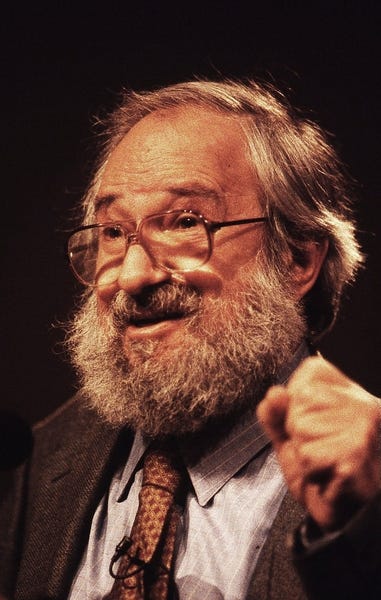#123 - Notes on Learning, Papert and Freire
Education Coffee is a 2xWeekly Newsletter on People, Ideas and Culture.
Why #LearningResearch?
My thinking on learning has evolved considerably over time. I have built on the work of so many educators and researchers. I am grateful to them for the work they do and the time they took from their schedules to document what they saw and observed in a variety of learning environments. In this series of #EducationCoffee newsletters I will aim to summarize the work of these thinkers in the most accessible way possible. I will add links to help you with further research.
Papert on Technology as a Learning Tool
Seymour Aubrey Papert was a South African-born American mathematician, computer scientist, and educator, who spent most of his career teaching and researching at MIT. He was one of the pioneers of artificial intelligence, and of the constructionist movement in education. His research on technology as a learning tool has helped shape my thinking about learning. You can learn more about his research by following the notes and links.
Seymour Papert was a pioneering figure in the fields of education, artificial intelligence, and developmental psychology. His research and philosophy on learning and education are deeply influential. Here are the key points summarizing his work and ideas:
Constructionism: Papert extended Jean Piaget’s constructivist theories, emphasizing that learning is most effective when learners are actively engaged in constructing tangible objects or systems in the real world. He believed that people learn best by making and creating things.
Learning by Doing: Papert advocated for experiential learning, where students learn through hands-on activities and problem-solving rather than passive reception of information.
Technology as a Learning Tool: He was a strong proponent of using technology, particularly computers, to enhance learning. He believed that computers could be powerful tools for children to explore, experiment, and express themselves.
LOGO Programming Language: Papert developed the LOGO programming language, which was designed to teach children mathematical concepts through programming. LOGO’s “turtle graphics” allowed children to visualize and understand abstract concepts by controlling a virtual or physical robot.
Microworlds: Papert introduced the concept of “microworlds,” which are simplified, controlled environments where learners can explore and experiment with ideas. These environments are designed to make complex concepts more accessible and understandable.
Child-Centered Learning: He emphasized the importance of tailoring education to the individual needs and interests of each child. He believed that children learn best when they are motivated by their own curiosity and interests.
Critique of Traditional Education: Papert was critical of traditional, rote-learning educational systems. He argued that these systems often stifle creativity and fail to engage students in meaningful learning.
Collaborative Learning: He supported the idea that learning is a social activity and that collaboration among students can enhance understanding and problem-solving skills.
Lifelong Learning: Papert believed that learning is a lifelong process and that education should prepare individuals to continue learning and adapting throughout their lives.
Influence on Educational Technology: His work laid the groundwork for many modern educational technologies and approaches, including the use of robotics, coding, and interactive software in classrooms.
Papert’s ideas continue to influence educators, technologists, and researchers around the world, promoting a more engaging, interactive, and student-centered approach to learning.
Freire on Critical Pedagogy
Paulo Reglus Neves Freire was a Brazilian educator and philosopher who was a leading advocate of critical pedagogy. His research on critical pedagogy has helped shape my thinking about learning. You can learn more about his research by following the notes and links.
Paulo Freire, a Brazilian educator and philosopher, is best known for his influential work Pedagogy of the Oppressed. His research and philosophy on learning and education emphasize critical consciousness, dialogue, and social justice. Here are the key points of his work:
Critical Pedagogy: Freire advocated for an educational approach that encourages learners to critically analyze and challenge societal structures, rather than passively accepting them.
Banking Model of Education: He criticized the traditional “banking” model, where teachers deposit knowledge into passive students, arguing that it perpetuates oppression and stifles critical thinking.
Problem-Posing Education: Freire proposed a dialogical approach where teachers and students co-create knowledge through dialogue, fostering critical thinking and empowerment.
Conscientization (Conscientização): A central concept in Freire’s work, it refers to the process of developing a critical awareness of social, political, and economic contradictions, leading to action for liberation.
Education as Liberation: Freire viewed education as a tool for liberation, enabling individuals to overcome oppression and transform their realities.
Praxis: He emphasized the cycle of reflection and action (praxis), where learning is tied to real-world experiences and social change.
Dialogical Learning: Freire stressed the importance of dialogue in education, where teachers and students learn from each other in a mutually respectful relationship.
Contextualized Learning: He argued that education should be relevant to learners’ lives, addressing their cultural, social, and economic contexts.
Opposition to Authoritarianism: Freire rejected authoritarian teaching methods, advocating for democratic and participatory education.
Social Justice and Equity: His work is deeply rooted in the belief that education should promote social justice, equality, and the empowerment of marginalized communities.
Freire’s ideas have had a profound impact on education, particularly in the fields of critical pedagogy, adult literacy, and community development.
Notes and Links
Seymour Papert Profile – https://dailypapert.com/about-seymour-papert/
Seymour Papert Book – https://dl.acm.org/doi/book/10.5555/1095592
Image Credit – https://news.mit.edu/2016/seymour-papert-pioneer-of-constructionist-learning-dies-0801
Paulo Freire Google Scholar – https://scholar.google.com/citations?hl=en&user=IdMf1V7YL6MC
Paulo Freire Profile – https://freire.org/paulo-freire
Paulo Freire Pedagogy – https://www.beds.ac.uk/jpd/journal-of-pedagogic-development-volume-2-issue-3/key-pedagogic-thinkers-paulo-friere/
Abhishek





